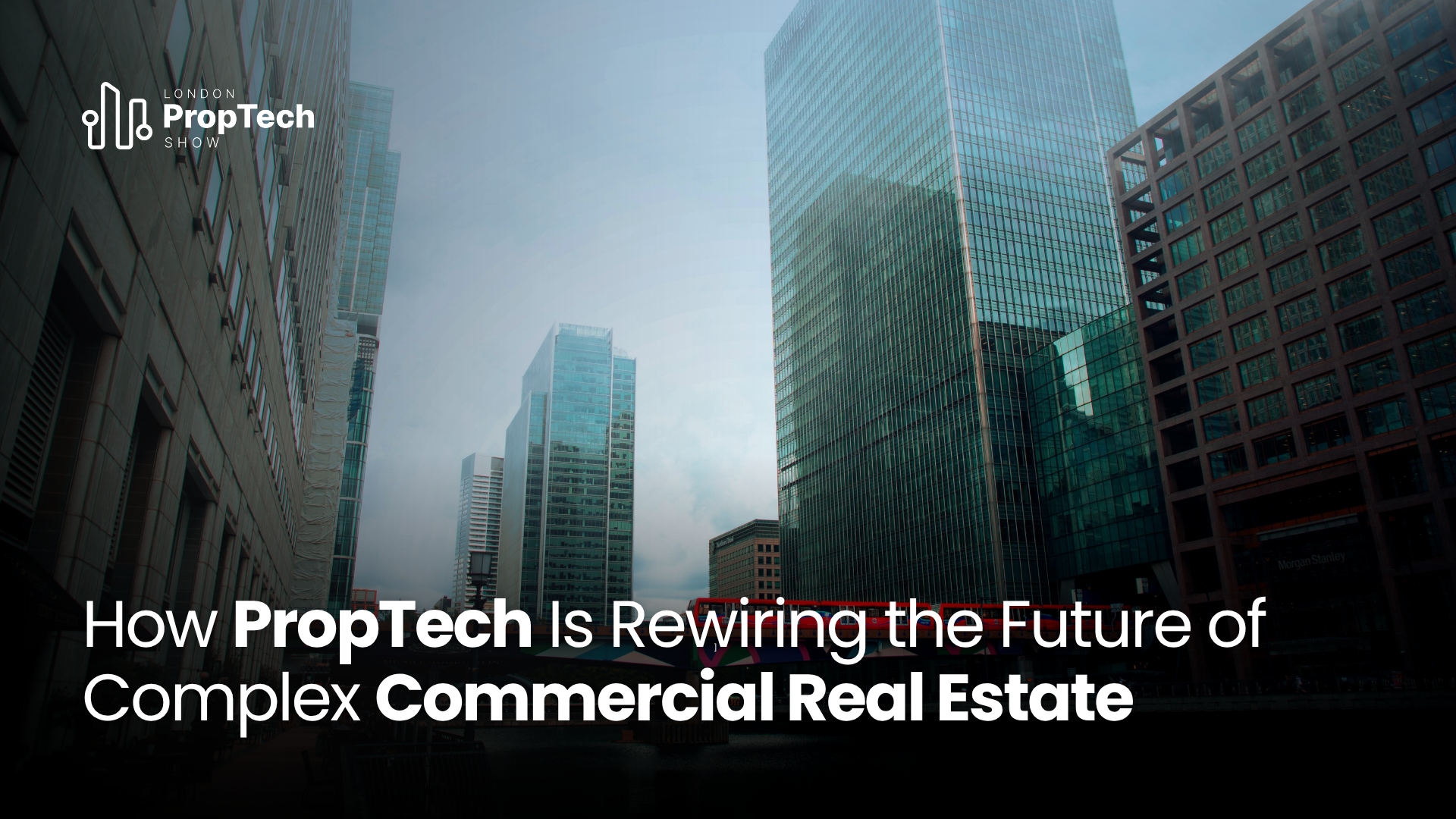In 2025, the commercial real estate (CRE) landscape is undergoing its most transformative decade yet. With mounting pressure to deliver sustainable performance, optimize asset use, and improve transparency, PropTech has moved from a niche innovation to a mission-critical pillar across the built environment. Nowhere is this shift more visible than in complex commercial real estate spanning multi-tenant offices, logistics hubs, retail portfolios, and mixed-use developments that demand real-time intelligence and long-term resilience.
As we look ahead to 2026, PropTech’s role in de-risking CRE portfolios, enhancing asset value, and driving data-led decisions is clearer than ever. According to EU-Startups, the European PropTech market is expanding rapidly, with Germany, the UK, and the Netherlands accounting for over 60% of deal activity this year. Venture funding, particularly for AI-driven, IoT-enabled, and energy-optimized projects, continues to accelerate even in slower macroeconomic conditions.
A Market at the Intersection of Technology and Transformation
Commercial property portfolios have become increasingly complex to manage. Investors face volatile energy prices, ESG compliance pressures, and evolving tenant expectations around wellness and flexibility. Traditional facility management models dependent on reactive maintenance, manual oversight, and legacy systems can no longer sustain large-scale operations.
This is where PropTech fills the void. Digital twins, predictive analytics, and blockchain-backed systems are now integral to CRE management and governance.
A prime example is Enerthing GmbH’s enerSENSE system, which bridges the gap between physical and digital environments through light-powered wireless sensors. These sensors continuously monitor air quality, occupancy, and energy performance enabling automation that can reduce building emissions and operational costs simultaneously.
Automation and AI: Reshaping How CRE Is Managed
Artificial Intelligence sits at the core of PropTech’s growing influence in complex real estate. As outlined by Real Estate Solutionist and Bisnow’s 2025 PropTech briefings, AI automation is redefining how property managers operate, from predictive maintenance to lease structuring.
Machine learning models are now capable of processing continuous building performance data to forecast maintenance needs before failures occur. Meanwhile, natural language processing is being used to automate lease analysis and risk assessment, drastically reducing the time and human oversight required for multi-asset reporting.
In Germany, Arbio’s AI-native property management system, which secured €31 million in new funding this October, exemplifies this new paradigm. Its platform automates up to 95% of property management workflows, pricing, guest communication, accounting, and compliance across 1,200 commercial and multi-unit assets in three countries. The company is now developing an AI-based sustainability scoring module, showing how automation can directly support ESG tracking within the CRE ecosystem.
AI and Sustainability: A Symbiotic Evolution
The convergence of AI and sustainability has become a defining European trend in 2025. According to Tech.eu and OpenVC’s latest investor analysis, over half of all new PropTech funding rounds this year have sustainability or data-driven elements, reflecting investor appetite for de-risked, compliance-ready solutions.
In the commercial sector, this translates to AI-powered energy optimization, predictive carbon measurement, and dynamic green leasing tools. These systems allow owners to simulate how energy retrofits or operational adjustments could lower carbon intensity and qualify assets for green financing.
The emphasis on building-level transparency is also aligned with the latest directives of the EU’s Energy Performance of Buildings regulation, which mandates all new buildings to be zero-emission by 2030. For institutional investors and REITs managing thousands of commercial assets, this regulation is accelerating deployment of PropTech platforms that gather and standardize ESG data at scale.
Blockchain and Tokenization: The New Frontiers of CRE Investment
Beyond operations, PropTech is transforming how capital flows within commercial real estate markets. Blockchain and tokenization are enabling the fractional ownership and trading of high-value properties, expanding access to investors and increasing market liquidity.
Swiss startup Azuro, for instance, raised €5 million in October to develop Europe’s first user-owned real estate portfolio leveraging blockchain. Though initially focused on residential leisure properties, this model has profound implications for CRE: by decentralizing ownership, these systems can enable cross-border commercial investments through secure, automated smart contracts.
Moreover, digital asset firms are emerging to tokenize long-term ground leases, logistics assets, and sustainable office projects. The European Business Review reports that AI-driven valuation models are now being integrated into these blockchain platforms allowing for near-instant appraisal updates based on live performance data.
Data-Driven Decision-Making in Asset Performance
Data has become the unifying thread across all facets of PropTech innovation in CRE. The ability to collect, interpret, and act on building-level data is now seen as a competitive advantage that influences portfolio returns.
In London, which boasts more than 900 PropTech firms , commercial developers are working with startups that leverage IoT building twins and predictive analytics to anticipate both mechanical performance and user behavior. These systems allow developers and landlords to identify inefficiencies, manage leasing more dynamically, and deliver customized tenant services.
2025 has also seen a marked rise in AI platforms built to assess retrofit ROI predicting how interventions like HVAC upgrades, window replacements, or solar integration impact both asset valuation and energy intensity. Such insights are essential for meeting European Green Deal targets while maintaining profitability in volatile markets.
From Predictive Analytics to Adaptive Workspaces
The shift toward hybrid working and flexible space design has driven significant PropTech adaptation in complex commercial buildings. AI-enabled occupancy sensors and analytics platforms now empower landlords to reconfigure office layouts dynamically based on real-time utilization patterns.
Systems like enerSENSE are helping facility managers integrate everything from air quality monitoring to lighting controls, ensuring that buildings adapt fluidly to human needs while eliminating resource waste. The resulting “adaptive workspace” model is quickly becoming the norm in London, Berlin, and Amsterdam where PropTech-driven flexibility is proving key to tenant retention and premium lease pricing.
Why Commercial Real Estate Can’t Afford to Ignore PropTech
Complex commercial property portfolios are high-stakes, high-value ecosystems. Yet mismanaged energy, data silos, and delayed responses to maintenance can erode millions in value annually. PropTech addresses these weaknesses head-on through algorithmic efficiency and systemic transparency.
The London PropTech Show 2026 summarized this perfectly: the future of real estate is not just digital, it's intelligent, generative, and responsible. Major developers and investors are now shifting their focus from adopting PropTech tools ad hoc to embedding technology at the strategic portfolio level.
The Road Ahead: From Adoption to Integration
The outlook for 2026 positions PropTech as the operating system for modern commercial real estate. AI will continue to play a defining role, not simply as an add-on but as the processor of real estate’s new data economy. We can expect:
- Deeper convergence between AI, IoT, and robotics for maintenance and energy optimization.
- Growth of tokenized investment ecosystems that democratize CRE ownership globally.
- Widespread adoption of digital ESG reporting infrastructures across Europe.
The UK remains an anchor market in this shift. With London hosting global showcases like the London PropTech Show at Excel, the city is reaffirming its place as the central hub of PropTech-driven transformation, uniting developers, technology innovators, and institutional investors in reimagining commercial real estate’s next chapter.
Conclusion
Complex commercial real estate sits at the crossroads of sustainability, digital transformation, and financial innovation. PropTech isn’t a supporting act, it's the structural framework redefining how assets are designed, managed, and capitalized.
As 2025 closes, AI-powered transparency, intelligent automation, and tokenized ownership models are proving that PropTech is no longer optional infrastructure; it's the foundation of resilient, profitable, and future-ready commercial real estate.


